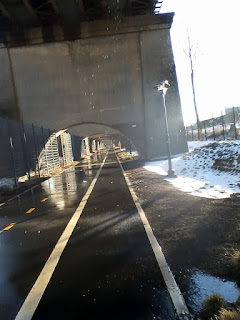Every culture has its odd and interesting ways of describing natural phenomena. One of my favorites is the "mariage du loup". The first time I heard it, I wondered what a wolf's wedding had to do with the weather I'd just experienced. For that matter, I wondered whether wolves indeed had weddings: Was there something I missed?
I was cycling near Chenonceau, which alone made me a very privileged individual at that moment. (Really, there are very few better places to ride!) The weather that day created the sort of picture that every agence du tourisme likes to post on its websites or brochures: a sea of sunflowers softly undulating a reflection of the sunlight that filled the clear blue sky.
At least, that's what I saw until the early afternoon. Then, I felt a couple of drops plip onto my arms. For a moment, I thought it was sweat, as the air had warmed up. But then I felt a few more drops on my legs, and on top of my head. Those drops were falling from the sky--but the sun shone as brightly as it had earlier in the day!
That night, I described my ride to a hostel-keeper. "Une mariage du loup," he said.
Most of you, I am sure, have experienced a "sunshower", perhaps during a ride. Although I've experienced them here in New York, I think they're more common in more open areas, like the countryside I was touring when I experienced the "mariage du loup".
I encountered it again, sort of, yesterday afternoon:
My first ride since last week's snow took me to Randall's Island, where rain fell on me as the sun shone. Well, actually, it wasn't rain: The snow was melting from the railroad viaduct over my head.
Now, if a train had rumbled overhead, I would have had a sun-thunder shower. Would that be a menage a trois des loups?
I was cycling near Chenonceau, which alone made me a very privileged individual at that moment. (Really, there are very few better places to ride!) The weather that day created the sort of picture that every agence du tourisme likes to post on its websites or brochures: a sea of sunflowers softly undulating a reflection of the sunlight that filled the clear blue sky.
At least, that's what I saw until the early afternoon. Then, I felt a couple of drops plip onto my arms. For a moment, I thought it was sweat, as the air had warmed up. But then I felt a few more drops on my legs, and on top of my head. Those drops were falling from the sky--but the sun shone as brightly as it had earlier in the day!
That night, I described my ride to a hostel-keeper. "Une mariage du loup," he said.
Most of you, I am sure, have experienced a "sunshower", perhaps during a ride. Although I've experienced them here in New York, I think they're more common in more open areas, like the countryside I was touring when I experienced the "mariage du loup".
I encountered it again, sort of, yesterday afternoon:
My first ride since last week's snow took me to Randall's Island, where rain fell on me as the sun shone. Well, actually, it wasn't rain: The snow was melting from the railroad viaduct over my head.
Now, if a train had rumbled overhead, I would have had a sun-thunder shower. Would that be a menage a trois des loups?


